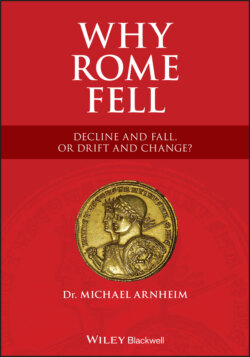Читать книгу Why Rome Fell - Michael Arnheim - Страница 64
Princeps Legibus Solutus Est
ОглавлениеThe reforms of Diocletian (r. 284–305) are generally lumped together with those of Constantine (r. 306–337). This is partly because of the scarcity of contemporary evidence of Diocletian’s reign and partly because there undoubtedly was a certain common thread running through both reigns though there was also one very major difference starting in the latter part of Constantine’s reign, as we shall see in Chapter 3. On the other hand, as we have already seen, some of the innovations attributed to Diocletian can be traced back to earlier emperors.
The great Roman jurist Ulpian (c. 170–228) summed up the emperor’s law-making powers in the formula: Quod principi placuit legis habet vigorem (What pleases the emperor has the force of law). (Dig. I.4.1.) Any doubt about the scope of imperial power in this regard is dispelled by Ulpian’s even more laconic and sweeping pronouncement: Princeps legibus solutus est (The emperor is not bound by the laws) (Dig. 1.3.31). Taken literally, this must mean that the emperor is above the law and, therefore, an absolute monarch. It has to be remembered that Ulpian’s opinions had no official status until they were incorporated into the Digest as part of the Corpus Juris Civilis (Body of Civil Law) by the Emperor Justinian in the year 533. Yet Ulpian’s dicta were written between 211 and 222 under the Severan dynasty, with reference to his own day, and they were not entirely theoretical. Ulpian himself served as Praetorian Prefect and chief adviser to the Emperor Severus Alexander (r. 222–235), which cost him his life at the hands of the praetorian guard, whose privileges he had reduced.
Ulpian’s contemporary, Cassius Dio, (c. 155–c. 235), confirmed that the emperor was “absolved from the laws,” and that this position could be traced back to the earliest days of the Principate. (Dio 53.18.1.) The Lex de Imperio Vespasiani (law concerning the constitutional powers of Vespasian”), dating from the year 69, confers upon the emperor a rather less comprehensive exemption from the operation of the laws, limiting it to the laws from which Augustus, Tiberius and Claudius had been exempted. However, this important document, only about half of which has survived on a bronze plaque, also contains a clause (number VI) conferring on Vespasian (r. 69–79) the right and power to do and execute “…whatever he shall consider to be in accordance with the public interest and the dignity of divine and human, public and private interests,” just like Augustus, Tiberius, and Claudius. (CIL VI. 930 = ILS 244.) The less than pellucid language of this clause has aroused great controversy. What exactly is the scope of the power described here? Taken literally and in isolation, it would appear to confer on Vespasian an all-encompassing power. However, this is restricted by the clause about the emperor’s dispensation from the laws, which exempts him only from those laws from which Augustus, Tiberius, and Claudius had been exempted. And even Clause VI makes it clear that Vespasian is not being granted any more power than had already been possessed by Augustus, Tiberius, and Claudius. There is a negative subtext here, as only the “good” emperors are cited as precedents, while the names of Gaius Caligula, Nero, Galba, Otho, and Vitellius are all studiously omitted. So, Vespasian is possibly being warned here not to assume any powers that the “bad” emperors may have arrogated to themselves. On the other hand, the broad powers conferred by Clause VI are far more extensive than the constitutional position depicted in Augustus’s Res Gestae, discussed in Chapter 1. Although that document is a work of propaganda, the reason for the inclusion of Augustus’s name in the Lex de Imperio may also have an ulterior motive, possibly to attribute to the revered founder of the regime novel powers being conferred on Vespasian.
Whatever the precise constitutional position of the emperor may have been in the Principate, in practice, Diocletian’s position was not very different. What was of greater concern to him was to break the longstanding pattern of “absolutism tempered by assassination,” a description originally applied to Tsarist Russia but equally applicable to the Roman Empire in the third century before Diocletian’s accession.
